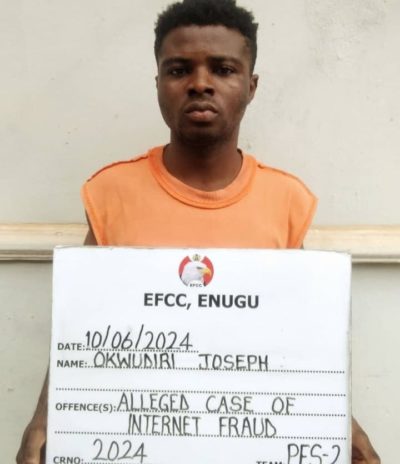The Economic and Financial Crimes Commission (EFCC) has secured the conviction of Okwudili Joseph for his involvement in internet fraud. Justice Mohammed Garba Umar of the Federal High Court, Enugu, presided over the case, convicting and sentencing Joseph to two years imprisonment for cybercrime and impersonation. The case was prosecuted by the Enugu Zonal Directorate of the EFCC on a one-count charge that exposed Joseph’s fraudulent activities.
The charge against Joseph revealed that he impersonated Jim Warren, an American gas detection specialist, to defraud unsuspecting individuals online. This criminal act, committed on June 5, 2024, violated Nigeria’s Cybercrimes (Prohibition, Prevention, etc.) Act of 2015, under Section 22 (3) (a) and punishable under Section 22 (4). Joseph pleaded guilty to the charge and was sentenced to either serve a two-year jail term or pay a fine of N200,000.00.
EFCC’s Case and Court Proceedings
During the court proceedings, the prosecution counsel, Mohammed Shehu, laid out the facts of the case and pushed for the court to convict and sentence Joseph accordingly. The charge made it clear that Joseph’s intent was to gain financially by impersonating a foreign professional, a tactic commonly used in cyber fraud schemes. His arrest and subsequent prosecution were part of the EFCC’s ongoing efforts to curb the rising tide of internet-related crimes in Nigeria.
On the defense side, G. C. Ugwele, Joseph’s counsel, pleaded with the court for leniency. Ugwele argued that her client had shown remorse for his actions and had learned from his mistakes. She further urged the court to temper justice with mercy. Despite this plea, Justice Umar handed down the two-year sentence but provided the option of a N200,000 fine as an alternative punishment, a decision aimed at striking a balance between justice and rehabilitation.
How Joseph’s Fraudulent Activities Were Exposed
Joseph’s journey to conviction began with his arrest on June 5, 2024, in the Nike area of Enugu, after EFCC operatives received credible intelligence linking him to fraudulent internet activities. During his interrogation, Joseph confessed to the crime, admitting that he had impersonated Jim Warren to deceive his victims. His confession, combined with other evidence, played a significant role in securing his conviction.
This case underscores the EFCC’s relentless efforts to combat cybercrime, a growing menace in Nigeria. The agency has ramped up operations in recent years, using intelligence gathering and advanced investigative techniques to track down cybercriminals. Joseph’s conviction serves as a warning to others engaging in internet fraud that the law will catch up with them.
Also Abuja Court Convicts Nelson Solomon for Internet Fraud
On September 9, 2024, the Abuja Zonal Directorate of the Economic and Financial Crimes Commission (EFCC) achieved a significant legal victory in the fight against internet fraud. Nelson Solomon was convicted and sentenced by Justice I. Nwosu of the FCT High Court Maitama, Abuja, for his involvement in a fraudulent scheme. Solomon faced a two-count charge of impersonation, cheating, and obtaining by false pretenses. The case underscores the EFCC’s ongoing efforts to tackle cybercrime in Nigeria and hold perpetrators accountable for their actions.
According to the court proceedings, Solomon was found guilty of fraudulently inducing individuals to transfer funds under false pretenses. Count one of the charges detailed that Solomon posed as John Scott, an American engineer, and deceived one Webbi J.W. Mary into transferring $100. Similarly, for count two, he pretended to be William Fernando, another American, to convince Miguela Okayama to send $100. These actions constituted violations of Section 321 of the Penal Code Act, Laws of the Federation 2004, and were punishable under Section 324 of the same Act.
Court Sentences Solomon and Orders Forfeiture
Upon his guilty plea, Solomon’s case was promptly addressed by prosecution counsel G.I. Ushie, who requested a fitting sentence for the convicted fraudster. Justice Nwosu delivered a verdict that included a one-year imprisonment or an alternative fine of N50,000 (Fifty Thousand Naira). Additionally, Solomon was ordered to forfeit his iPhone to the federal government as part of the sentence. This decision reflects the court’s commitment to imposing strict penalties on individuals involved in cybercrimes, aiming to deter similar offenses and promote justice.
The verdict serves as a warning to others involved in internet fraud, demonstrating the EFCC’s resolve in curbing cybercrime and ensuring that offenders face substantial legal consequences. The forfeiture of Solomon’s iPhone also highlights the government’s broader strategy to confiscate assets linked to fraudulent activities, further supporting efforts to disrupt and dismantle fraud networks.
Table of Contents
Discover more from OGM News NG
Subscribe to get the latest posts sent to your email.













